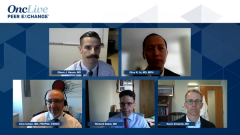
Hedgehog Inhibitors and Basal Cell Carcinoma
Ezra Cohen, MD, FRCPSC, FASCO, and Gino K. In, MD, MPH, elaborate on the role hedgehog inhibitors can play when treating patients with basal cell carcinoma.
Episodes in this series

Glenn J. Hanna, MD: The multidisciplinary team evaluates this patient and decides that this dorsal nose basal cell carcinoma [BCC] is not a great candidate for surgery and/or radiation, based on size, location, and some of the features you all discussed. The patient gets started on vismodegib 150 mg daily, a hedgehog inhibitor. We’ll start with Dr Cohen, tell us about hedgehog inhibitors for the treatment of BCC, and how are we selecting patients for this, and what are some practical points about using hedgehog inhibitors in this scenario?
Ezra Cohen, MD, FRCPSC, FASCO: Let’s step back and talk about why hedgehog inhibitors were initially even of interest or studied in this disease. And that goes back to sequencing data that began to emerge more than a decade ago, noting that almost all basal cell carcinomas had an alteration in this pathway, and they may be potentially quite responsive to hedgehog inhibition. It turns out that after a fair number of clinical trials with different agents, including vismodegib, that the response rate for patients is somewhere in the range of about 50%. It’s higher if the patient only has locally advanced disease, and this gentleman may have higher than a 50% response rate, but certainly it’s appreciable and substantial. Now, the duration of response can be prolonged in some patients, and in fact, the median duration of response, again, is longer in the locally advanced setting, but even in patients with metastatic disease, was over a year in the phase 2 studies. Certainly, there’s efficacy with these agents. The other side of the coin of course is toxicity, and although these agents are not associated with life-threatening toxicity, they can be life altering or certainly quality of life altering toxicities. Many patients may have muscle spasms, fatigue, they may lose their hair, or even lose their appetite or lose their taste. And personally, for many patients, I end up giving them drug holidays for substantial periods, weeks or even a couple of months, or dose reduction. That would not be unusual at all.
Glenn J. Hanna, MD: Let’s take a moment to allow our additional panelist to join; it’s a good time to have a systemic therapy discussion. Dr Gino In is joining us. Dr In, do you want to introduce yourself?
Gino K. In, MD, MPH: Yes, I’m a medical oncologist at the University of Southern California.
Glenn J. Hanna, MD: Gino, not to put you on the spot, but since we’re on the systemic therapy question of using hedgehog inhibition, can you comment about first-line hedgehog inhibitors, when are you thinking about a clinical trial for a patient like this? Would there be a case where you wouldn’t necessarily use a hedgehog inhibitor and you might think more about a platinum-based chemotherapy regimen? Certainly, we’ll get to immunotherapy in just a moment. And how do risk factors and immunosuppression play into your decision-making in systemic therapy?
Gino K. In, MD, MPH: There were multiple little topics that you mentioned. And that speaks to the complexity of these patients. Careful decision-making is required, because on one hand, certainly one of the biggest things in my mind is what’s the volume of disease and what are the goals with systemic therapy? Are we potentially trying to achieve a cure? Or is it metastatic and are we looking at palliation? That plays a big part in the discussion. For patients who have low-burden disease, tumors that are unresectable but not necessarily life-threatening, hedgehog inhibitors can be a reasonable approach. Certainly, managing the toxicity is an important component. But for the patients who progress on hedgehog inhibitors, who don’t demonstrate any sensitivity, or we see patients sometimes with metastatic disease, even though that’s an uncommon scenario, those are the patients where sometimes we talk about clinical trials or about potentially consider platinum-based therapies.
Glenn J. Hanna, MD: One last question before we move to immunotherapy is, for you or Dr Cohen, do you ever reach challenge with hedgehog inhibition? There is this idea that if someone has a potential response and then develops progression, if you tried other regimens in between, is there possible clonal selection where you end up getting back to a state where they may be sensitive to the drug? I was just curious if you guys had any examples in your patient experience with that.
Ezra Cohen, MD, FRCPSC, FASCO: I’ve personally never done that. It’s hard for me to comment. I’m not sure if others have, but I’ve never done that.
Glenn J. Hanna, MD: OK. Gino, any thoughts on the matter?
Gino K. In, MD, MPH: Yes, I’ve had a couple of patients who in the absence of clinical trials or certainly PD-1 therapy, when there were no other options, we retreated. Because there are 2 different hedgehog inhibitors available, if I’ve used vismo [vismodegib] first, then I’d try sonidegib second. And in my experience, those patients who were sensitive in the first place, sometimes did respond again later, but the toxicity also did catch up with us too.
This transcript has been edited for clarity.




































